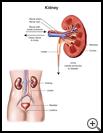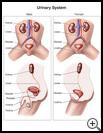
Pyelonephritis
What is pyelonephritis?
Pyelonephritis is a bacterial infection that can affect one or both of the kidneys. It usually starts in the urethra, which is the tube that empties urine from the bladder, or in the bladder itself. The bacteria travel up to the kidneys from the bladder. Bacteria can also reach the kidneys from an infection somewhere else in the body.
Pyelonephritis can be serious because it can permanently damage the kidneys and the infection may enter the bloodstream.
What can I expect in the hospital?
You may need to stay in the hospital because you:
- Have an abnormal urinary tract structure or a blockage that needs to be treated as soon as possible
- Need medicine and fluid through an IV
- Are not able to take in enough fluids because of vomiting
- Are not able to urinate
- Have another medical condition, such as diabetes that is worsened by the kidney infection
Several things may be done while you are in the hospital to monitor, test, and treat your condition. They include:
Monitoring
- You will be checked often by the hospital staff.
- Your heart rate, blood pressure, and temperature will be checked regularly.
- Your blood oxygen level may be monitored by a sensor that is attached to your finger or earlobe.
- Your fluid intake may be monitored closely by keeping track of everything you eat and drink and any IV fluids you receive.
- You may have a small tube (catheter) placed into your bladder to drain and measure urine.
Testing
Testing may include:
- A physical exam to check for pain in the kidney area
- Urine tests to check for bacteria or blood in your urine
- Blood tests to check for infections or other medical problems
- Blood, urine, or other tests to monitor how well your organs are functioning
- X-rays: Pictures of the inside of the urinary tract to check for kidney stones or abnormal urinary structures
- Ultrasound scan: Sound waves and their echoes are passed through your body from a small device that is held against your skin to create pictures of the inside of the urinary tract to check for kidney stones or abnormal urinary structures.
- Computed tomography (CT) scan: A series of X-rays is taken from different angles and arranged by a computer to show thin cross sections of the kidneys.
- Retrograde urogram: A series of X-rays is taken after contrast dye is injected into a vein to find a blockage in the kidneys or ureters.
Treatment
The treatment for a kidney infection depends on your symptoms, how well you respond to treatment, your overall health, and any complications you may have.
- You will have a small tube (IV catheter) inserted into a vein in your hand or arm. This will allow for medicine to be given directly into your blood and to give you fluids, if needed.
- Your provider may prescribe medicine to:
- Treat pain
- Treat the infection or prevent future kidney infections
- Treat nausea or other symptoms caused by the kidney infection
- Your provider may recommend other types of therapy to help relieve pain, other symptoms, or side effects of treatment.
- If you have an abnormal urinary tract or stones in your urinary tract, you may need surgery to correct the problem.
What can I do to help?
- You will need to tell your healthcare team if you have new or worsening:
- Chills or sweats
- Back or belly pain
- Loss of appetite
- Nausea or vomiting
- Increased urination
- Pain or burning with urination
- Urgent need to urinate often
- Blood in your urine
- Redness, swelling, pain, warmth, or drainage from your surgical wound
- Fever, chills, or muscle aches.
- Ask questions about any medicine or treatment or information that you do not understand.
How long will I be in the hospital?
How long you stay in the hospital depends on many things, such as your general health, why you are in the hospital, and the treatment you need. The average amount of time to stay in the hospital with a kidney infection is 3 to 5 days. Talk with your provider about how long your stay may be.
Last modified: 2016-03-30
Last reviewed: 2015-12-21


